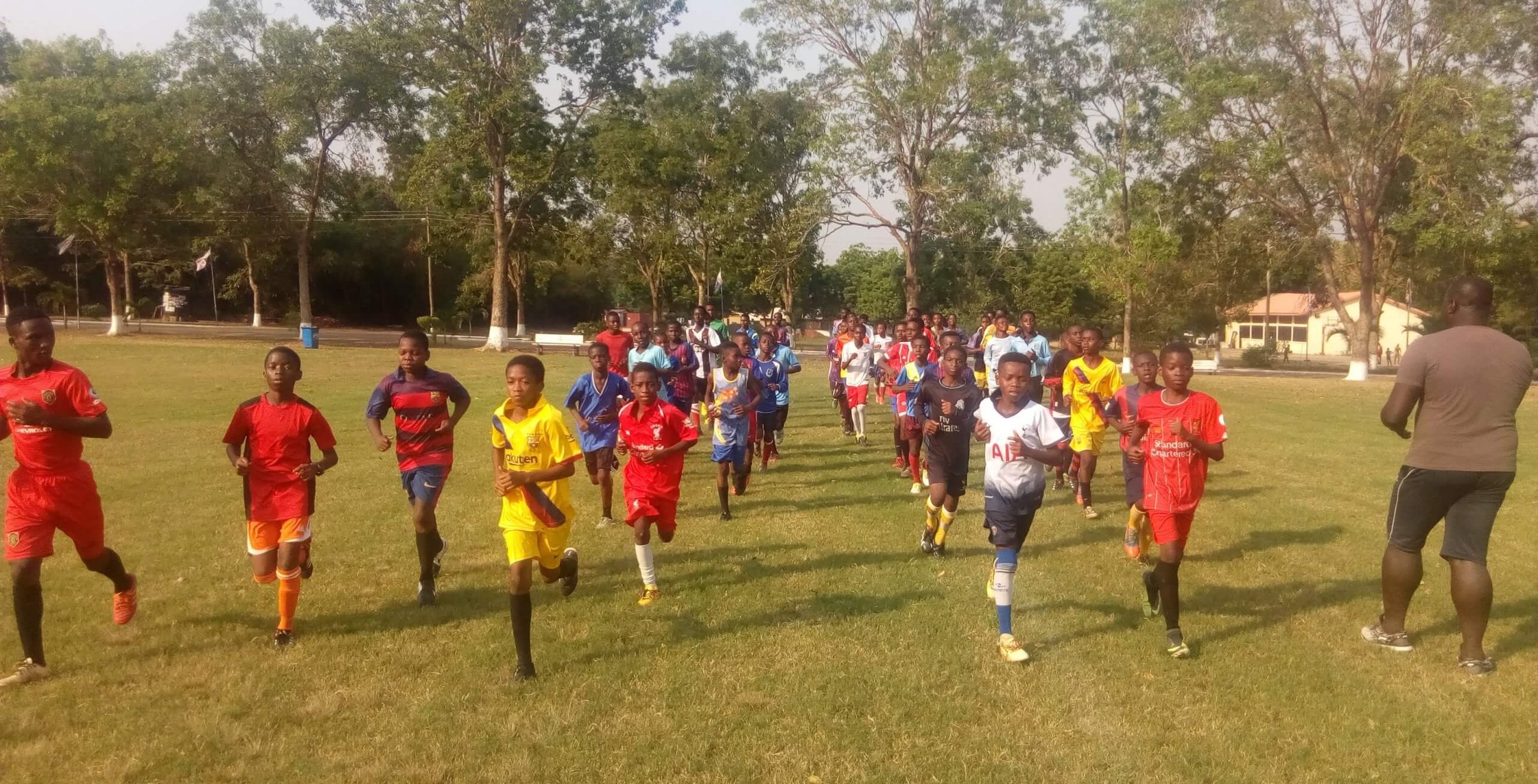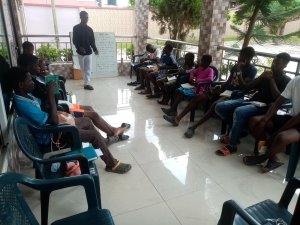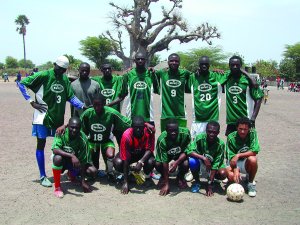The mission field on the football field
Kate Azumah

ABI’S STORY, GHANA: Abigail Mensah did not play football, but she loved the game and keenly followed happenings in the sport’s world. She loved Jesus and young people, and knew the Lord wanted her to reach out to youth outside the church, but she didn’t know how to go about it.
“The burden was so strong, I nursed it in prayer for six years until I found a brochure at home advertising a training on ‘whole life coaching’. I had never heard about sports ministry, but the information in the brochure leapt out to me, and I thought, ‘This is it!’”
Despite being a wife and a mother to four young boys, Abigail made arrangements to attend the training, and what she received in one hour was enough to set her off.
A team is born
Shortly after the training, Abigail asked someone at her church to invite his unchurched friends to a football park on Saturday, 3rd December 2011. Twenty-eight boys gathered, marking the beginning of her football team, Beautiful Feet.
“The following week, our number doubled, and we kept increasing up to over a hundred. We had boys and girls of all ages; those who did not belong to any team, those who trained with other teams during the week but joined us on weekends, those who had been kicked out of teams, and some Muslims. It was tough handling them. I panicked and cried to God for help.”
Abigail got a professional coach to assist her for a while. After he left, she got another ‘Christian’ coach who came to teach her boys dubious means of tackling opponents. She fired him, and discerned that God wanted her to coach the team herself.
“I began to study coaching online. Since I already knew the game, I’d teach what was in my mind to my eldest son who was seven years old and a good player. He would then demonstrate the drills when we got to the field. God encouraged me and gave me confidence. Once on the field, I went into full action.”
“It’s easy to get carried away by the excitement of play and forget the purpose of sports ministry. From the onset, I informed them that the Word of God and worship would be central in what we did. We began with prayer, did warm-ups and drills, and played a game to put the drills into practice. During downtime I’ll share the Bible lesson for the day. Those who came realized that we were different from the other teams. We showed them a lot of love and were interested in their lives beyond the field, and so they brought their friends. God directed us to feed them after every session for a whole year at a time when we were at our lowest financially. It was a test for us of God’s faithfulness to provide.”
The ball at home had attracted them.
Occasionally, Abigail’s husband and other sports ministry experts got involved. She also attended more trainings to build her competence and became known as ‘Coach Abi’.
Disciple-making and growth
“We realized that 15 minutes of Bible lessons on the field was not enough, so we began a midweek Bible study at my church which was close to the football field. They had so many questions, our scheduled one hour ran into two hours on some days. By this time, the numbers had reduced drastically, sometimes to just 18 on the field. We were heartbroken initially, but we perceived that the Lord wanted us to go deeper with the few whose hearts were open.”

Church at Coach Abi’s home
The next phase of growth happened through camps. “Many of our boys were first generation Christians from underprivileged homes, and so the camps provided a different atmosphere. They experienced God’s presence and the work of the Holy Spirit. We also invited father figures and model big brothers to speak to them. We noticed those who were growing and began training them as leaders. Soon, we were having multiple camps for different purposes.”
Coach Abi and her team focused on holistic discipleship. They visited the homes of the boys and met their families. On Sundays, she’ll drive them to her church. Schooling had not been a priority for the boys, but she encouraged them to take it seriously. She invited them to her home to study and helped them with school work.
Eventually, Abigail and her family moved to a different part of town and more boys gathered in her house—the ball at home had attracted them, and another Beautiful Feet started. Instead of driving this team all the way to her church, she started one at home on her porch. “The boys were more comfortable here than at my affluent church. We worship simply using gallons as drums, but we do it wholeheartedly. We pray, share testimonies, and discover God’s Word together.”
Influence and Multiplication
“Some of our boys carried back home what they learned, and initiated prayer times with their families. Many had never thought about pursuing tertiary education, but we now have some in high school and in university. They also know and can teach God’s Word. Some have four to five disciples they are walking with and have WhatsApp groups for sharing their devotions. Our midweek Bible study now happens in five home cells, with about 15 people in each meeting. Their parents share with us how they are growing in every area of their lives.”
Presently, Beautiful Feet goes on sports missions to other towns to establish similar teams, sometimes staying up to two months. When they first arrived in Goi, for example, they didn’t know anyone. All they did was to start playing on a field and the boys came. Now, Beautiful Feet has a station in Goi, and in three other places. Sixty to 70 players in four age divisions meet weekly. They have also helped other people to establish a total of eight similar teams in northern Ghana for disciple-making through football. Now Abi takes a backseat when she visits her teams. She has raised enough leaders to run things.
Overcoming challenges
“God has proved his faithfulness to us concerning finances for running Beautiful Feet. Whether for feeding, schooling or running camps, he provided the funds in the nick of time.”
“As a woman, I had a lot of pressure from other male coaches who wanted me to hand my team over to them. Some of the players also wanted our team to join association football, so they could progress to playing professionally, but the Lord didn’t give me peace about going that route.”
“The journey of disciple-making requires lots of patience. We may have our strategies with plans and timelines, but the disciples are also on their own journeys with the Lord. Sometimes, we are disheartened when some boys are still the same after all the investment we have made in them; but nothing is as beautiful as seeing the transformation, such as when some of them go off by themselves to wait on the Lord or explain God’s Word in a powerful and relevant way.”
JUNIOR’S STORY, SENEGAL: At a Youth For Christ camp outside Dakar one day, the camp director asked Junior Kaki to coordinate a sports outreach. Junior organized a football team from the camp, and they went out to play with non-Christians. They built a good relationship with the other team, shared the gospel, and later invited them to the camp where they had a good interaction with the mostly Muslim players.
Upon returning to Dakar, Junior kept thinking about how football had opened a door for the gospel, and this inspired him to form a team with people from different churches. His aim was to organize matches and tournaments for his team to connect with and play with non-Christians in order to share the gospel with them.
Faith meets football

Junior Kaki’s football team
Football was Junior Kaki’s life and passion. He had played for many local teams in many places and had dreams of becoming an international player. As a child, Junior had attended church with his family in the Central African Republic. The fear of God was instilled in him, but he did not give his life to Christ. He later joined some friends who influenced him negatively and to remedy the situation, he was sent to his father in Senegal. His father taught him about Jesus and he also met Christians who lived differently. His turning point came when his mother gave him a gospel tract with the image of two kinds of Christians—one who was in charge of his own life and asked God to bless his decisions, and the other who let the Lord direct his life.
“Instantly, I knew which kind of Christian I was, and I yielded my life to the Lord. I desired to see young people follow Jesus, and since God didn’t give me the opportunity to become a professional player, I channelled my gift into becoming a coach to young people.”
A better way
“In majority Muslim Senegal, preaching the gospel in conventional ways is very difficult, but sport is a big thing and offers many opportunities to do this effectively. Before we start any match with non-Christians, we make a big circle and I stand in the middle to share with them our reason for playing. I tell them about the love, joy, and peace we have found in Jesus and our desire to share this with them because we love them. After the match, we give an exhortation and invite them to accept Jesus.”
“Playing sport helps us to develop relationships with others and to demonstrate Christlike character and love. We don’t judge the non-Christians we go to play with. Sometimes, missionaries go to the field with an attitude of superiority, but we need to be down-to-earth and show an interest in their lives. This opens them up to relate with us. Sports ministry is a holistic outreach. When the young people have a problem, they come to me and sometimes, I go to their families. When some of them accept Christ, we connect them to churches near them and follow up to find out how they are doing.”
“I see the transformation in the lives of the non-Christians we play with. We were travelling to go play a tournament in another town when our car broke down. After we stopped, one of the Muslim players asked us to pray to Jesus before continuing our journey. It was good to see the impact of our ministry in his life. During a devastating flood in Senegal in 2003, we visited many of the young people who were victims and encouraged them in their time of difficulty. In Senegal, when teams win matches, they give the glory to the marabouts, but we see in our matches that the young people give the glory to God when they win. Some of those we reached out to at the beginning of our ministry are now influential people around the world, but they keep in touch with us because they recognize our investment in their lives and they are grateful.”
Despite these positive testimonies, Junior laments that in Francophone Africa, the Church doesn’t see the importance of sports ministry.
Sports for missions
Coach Abi shares, “Sport is one of the greatest tools any missionary can use on the field to reach the unchurched, the unreached, or those from other religions. The ball is a natural mobilizer and connector. You don’t need a flier or a megaphone to gather people and you can easily play with a Muslim even if you are a pastor. Disciple-making is about relationships and one thing will lead to another. Start by sharing the Word of God in the form of a story. Sport is also a retainer and they will keep coming week after week. The Word of God has power and it will bring the transformation as you water it with prayer. God will begin to draw some of them to you, so you go deeper with them. They may follow you home or invite you to theirs. You’re discipling them even before they make a decision for Christ.”
There’s a family of people doing sports ministry worldwide who are happy to assist any missionary wanting to change the game on the mission field with the ball … or some other form of sport or play. Contact Coach Abi at: abigailmensah@gmail.com
PRAY FOR:
- God’s provision for sports ministries around the world
- God’s transforming work in the lives of sports people.
 Expand Your Vision in 2026
Expand Your Vision in 2026